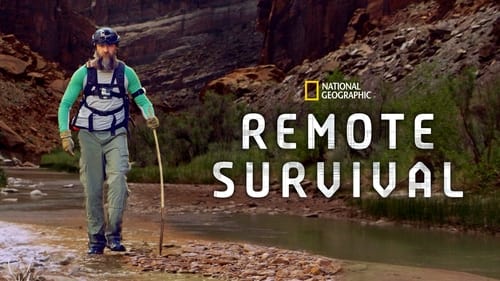Jasper Magee
I saw Remote Survival on Netflix and thought that it would have some promise. I don't know what I was hoping for--to learn survival techniques? To see an intense, manly competition? To watch some poor sap lose a fight against nature? To see something new in the genre? So I gave it a go, but only made it one episode in.The premise of the show is that a city-slicker type (the survivalist) is navigated through various wilderness landscapes and scenarios by a survival expert who is removed to a remote location. The survivalist is armed to the teeth with cameras, including a first person view which is transmitted to the remote expert. His gear contains little else. In addition to helmet cameras, there are several motion-tracking tripod cameras along the way that document the experience, a setup that was seemingly inspired by the arena in the Hunger Games. The effect is that we are watching man tackle nature completely alone, with the exception of his lifeline on the end of the radio. It is an interesting premise, but I wonder if it could have ever realistically been done and still kept an authentic note of isolation and danger. As it turns out, I actually kept getting the sense that if we were to pull the curtain back, we would see a whole camera crew moving along with the survivalist and setting up the cameras along the way. Am I really expected to believe that a guy is carving his own way while being tracked by hundreds of cameras over the course of several miles? Several shots are clearly done by a hand-held camera--which made me question the whole purpose of the man-tracking tripod cameras. It's the first thing that makes you feel like you're watching a gimmick.My biggest gripe with the show is that it follows every other modern reality TV show to a T. This is tragically apparent when the survival experts are speaking. They should be the most interesting and intense aspect of the show, but every line was clearly scripted and read (unconvincingly) by the survival experts, with their tone seldom matching the situation. Because of this, there was never a time that I felt like the expert was going along on a journey with the survivalist and reacting spontaneously to real events. As one small example, one survivalist came "spontaneously" across a lizard. The expert instantly states the following in a monotone voice: "Two of the most common lizards in this area are the Whiptail and the Desert Spiney because they love this arid environment. Both are edible but they move quick. Do you think you can catch it?" The show wants you to believe you're watching a man fighting the wild all alone while being completely directed by the expert in real time, but then it defeats itself by trying to maintain the terrible clichés of reality shows, such as cutaway interviews, gimmicks, and scripted dialogue.One thing I was grateful for was that they didn't really play up the city-slicker trope too much. One survivalist, Andrew, voluntarily bit the head off a snake because it bit him. He got into the spirit of the show and I had a good laugh. But he was the one who stayed with it. The other contestant, Paul, bailed out halfway through the episode because he refused to drink the water he found or eat the lizard he caught. Essentially, he became too uncomfortable and was bailed out at a push of a button--with little protestations from the survival expert. His reason for his drop-out is that his back was sore. I would have loved to at least see him tough it out for a night after being too lazy to eat or make a shelter. Other shows like Naked and Afraid showed us what real desperation looks like and gave us a look at what survival is like. I've seen more desperation on a Boy Scout hike than I did on Remote Survival.There was little adventure, little survival knowledge imparted, and little danger. Having the word "survival" in the name should reflect a sense of awe for nature that surviving inspires--yet this show was as uninspirational as an episode of House Hunters. I hope to see an end to formulaic reality shows, especially as it concerns manly pursuits. Just give us the nitty gritty and give it to us straight. We know what actual reality looks like and we desire to learn how to better tackle it. It's what we came for.


